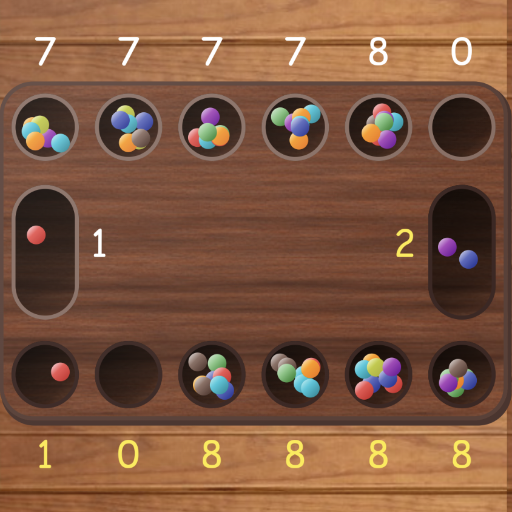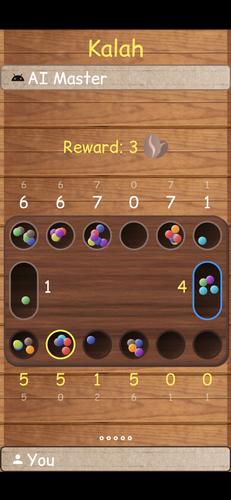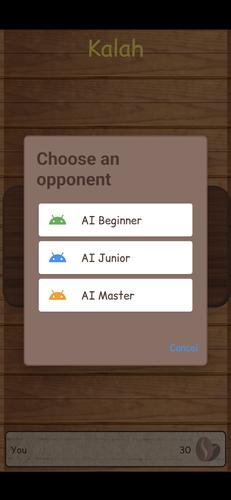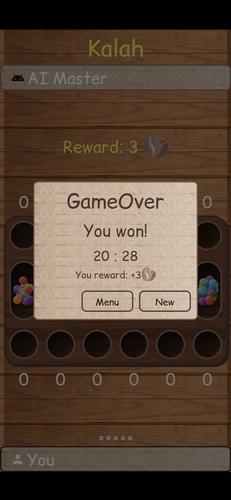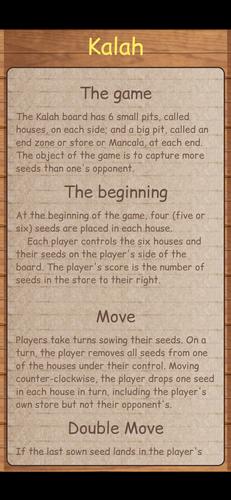Mancala games
Mancala games form a captivating family of two-player, turn-based strategy board games, perfect for enthusiasts of intellectual challenges. Rooted in ancient traditions, these games are played using small stones, beans, or seeds distributed across rows of pits or holes on a board. The primary goal is often to capture all or part of the opponent's pieces, making each move a calculated decision.
Within the vast Mancala family, notable games include Oware, Bao, and Omweso. This implementation focuses on Kalah, Oware, and Congkak—each offering its unique twist on the classic gameplay. The standard board features six small pits, known as houses, on each side, along with a large pit called the end zone or store, positioned at either end. The ultimate aim is to secure more seeds in your store than your opponent.
Kalah Rules:
- At the start, four (or five to six) seeds are placed in each house.
- Each player manages the six houses and their seeds on their side of the board. Their score equals the seeds in their store.
- Players sow seeds by removing all seeds from one of their houses and distributing them one by one into subsequent houses, moving counter-clockwise. The player's store is included, while the opponent's store is skipped.
- If the final seed lands in an empty house owned by the player, and the opposite house holds seeds, both are captured and added to the player's store.
- Landing the final seed in the player's store grants an extra turn. There is no limit to the number of moves per turn.
- The game concludes when one player clears their houses. The other player gathers their remaining seeds into their store, and the player with the higher score wins.
Oware Rules:
- At the beginning, four (or five to six) seeds occupy each house. Each player controls the six houses on their side, with their score reflecting the seeds in their store.
- On their turn, a player removes all seeds from one house and distributes them one by one, counter-clockwise, skipping the starting house and the opponent's store.
- Captures occur when the final seed lands in an opponent's house, bringing its count to exactly two or three. All seeds in that house are captured and added to the player's store. This process continues retroactively if the previous house also holds two or three seeds.
- If the opponent's houses are all empty, the current player must make a move that provides seeds to the opponent. Failure to do so results in the current player capturing all their own seeds, ending the game.
- The game ends when one player surpasses half the total seeds, or when both players reach half, resulting in a draw.
What's New in Version 1.4.1
Last updated on August 6, 2024 - Includes bug fixes to enhance gameplay stability.
Mancala games
Mancala games form a captivating family of two-player, turn-based strategy board games, perfect for enthusiasts of intellectual challenges. Rooted in ancient traditions, these games are played using small stones, beans, or seeds distributed across rows of pits or holes on a board. The primary goal is often to capture all or part of the opponent's pieces, making each move a calculated decision.
Within the vast Mancala family, notable games include Oware, Bao, and Omweso. This implementation focuses on Kalah, Oware, and Congkak—each offering its unique twist on the classic gameplay. The standard board features six small pits, known as houses, on each side, along with a large pit called the end zone or store, positioned at either end. The ultimate aim is to secure more seeds in your store than your opponent.
Kalah Rules:
- At the start, four (or five to six) seeds are placed in each house.
- Each player manages the six houses and their seeds on their side of the board. Their score equals the seeds in their store.
- Players sow seeds by removing all seeds from one of their houses and distributing them one by one into subsequent houses, moving counter-clockwise. The player's store is included, while the opponent's store is skipped.
- If the final seed lands in an empty house owned by the player, and the opposite house holds seeds, both are captured and added to the player's store.
- Landing the final seed in the player's store grants an extra turn. There is no limit to the number of moves per turn.
- The game concludes when one player clears their houses. The other player gathers their remaining seeds into their store, and the player with the higher score wins.
Oware Rules:
- At the beginning, four (or five to six) seeds occupy each house. Each player controls the six houses on their side, with their score reflecting the seeds in their store.
- On their turn, a player removes all seeds from one house and distributes them one by one, counter-clockwise, skipping the starting house and the opponent's store.
- Captures occur when the final seed lands in an opponent's house, bringing its count to exactly two or three. All seeds in that house are captured and added to the player's store. This process continues retroactively if the previous house also holds two or three seeds.
- If the opponent's houses are all empty, the current player must make a move that provides seeds to the opponent. Failure to do so results in the current player capturing all their own seeds, ending the game.
- The game ends when one player surpasses half the total seeds, or when both players reach half, resulting in a draw.
What's New in Version 1.4.1
Last updated on August 6, 2024 - Includes bug fixes to enhance gameplay stability.

